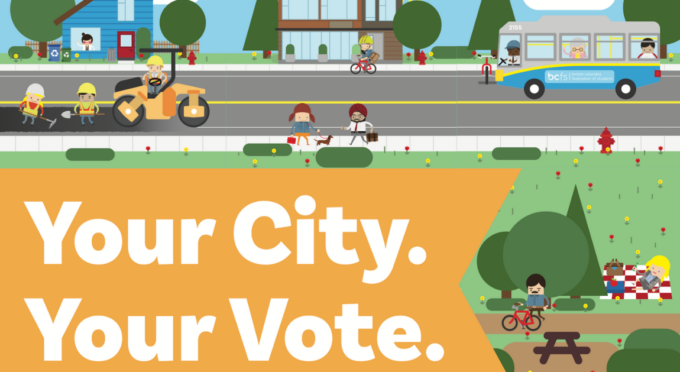Your City. Your vote.
We all know the importance of civic engagement and we make our voices heard in provincial and federal elections, but what about municipal elections?
Sometimes, it’s hard to know what our locally elected city officials do and yet there are important decisions made that impact our lives everyday!
Our Communities. our vote.
Municipal elections can be the most challenging level of government elections to talk with members about. Why? Well, it seems that while people can typically see how policies and legislation of the provincial and federal governments affect their lives, many people aren’t aware of what their city or town councils actually do.
Beyond that, there are many positions we are voting for: depending on where you live, you might be voting for councillors, mayor, regional districts, boards of education, park boards, and community commissions. That’s a lot to learn!
This municipal election, let’s make the most of this opportunity to speak with members. Some basic discussions can be an eye-opening experience for members and could spark their desire to get informed and to vote!
Understanding Local Government
why do we have local governments?
Whether you live in a rural area, in a small village or town, or in a large urban centre, local government is tasked to take care of community needs.
• Specifically, local government (municipalities and regional districts) shapes communities by offering essential services, regulates local policies, regulates land-use/development, and plans for the future economic growth of the community.
Why should I care?
Services. Local government provides and maintains essential services that you use every day:
- clean water
- public transit
- affordable housing/zoning
- garbage collection
- composting/recycling programs
- sewer systems
- roads and sidewalks
- streetlights
- fire and police protection
- libraries
- parks and recreational programs
- snow removal
- facilities (skating rinks, gymnasiums and swimming pools)
what else does the municipal government do besides services?
Local governments provide regulation in several different areas:
- land management: use and development, zoning, housing density • business licensing
- building permits and inspection
- commercial vehicle licensing
- dog licensing
how does the municipal government pay for all of these things?
You pay for it! Sources of municipal revenue come from you—the community member—in the form of taxes, user fees, and other levels of government:
- property taxes (around 50%)
- grants/transfers from other levels of government (10%)
- user charges for facilities and services (30%)
- developer contributions (9%)
- partnerships
how can i find out what my local government is working on?
You can read the municipal annual report! Municipalities are required to prepare an annual report, providing information on finances, taxes, services and operations, and objectives and measures met during the year and those set for the next year.
MUNICIPAL ELECTION: DATES TO KNOW
Campaigning for the municipal elections officially starts in September, though you have likely already seen many candidates campaigning in your area. Campaigning will run all the way until October 15.
Voting day – the most important date to know – is Saturday, October 15.
Voting Day is October 15, 2022 – Are You Ready to Cast Your Vote?
Voter Eligibility
In order to be eligible to vote locally as a resident or non-resident property elector, a person must:
- Be 18 years of age or older when they register to vote, or 18 years or older on general voting day,
- Be a Canadian citizen,
- Have been a resident of B. C. for at least six months before they register to vote,
- Have either lived or owned property in the jurisdiction in which they intend to vote for at least 30 days before they register to vote, and
- Not be disqualified under the Local Government Act, or any other enactment, or by law from voting in a local election
Students who live in one jurisdiction and attend an educational institution in a jurisdiction different from their usual place of residence may vote only once–either in the jurisdiction where they attend school or in the jurisdiction that is their usual place of residence.
Getting on the voters’ List
There are 2 ways to make sure you are on the voters’ list:
- We encourage you to register/update your information online with Elections BC
- You can also register on voting day
Important things to bring to vote
You will need 2 pieces of identification in order to vote:
- 1 ID must have your name and residential address
- 1 ID must include your signature ex. Driver’s License, BC Services Card, Status Card, Passport
Goals:
- Increase awareness of municipal election issues
- Increase student voter registration and turnout
Voter & Candidate Information!
Learn more about who is eligible to vote, where to vote, candidate information, and more
2022 Municipal Election Information! arrow_forward
